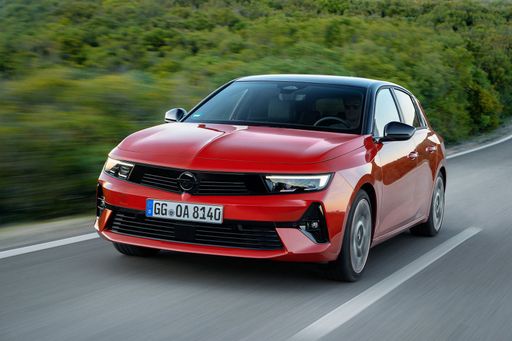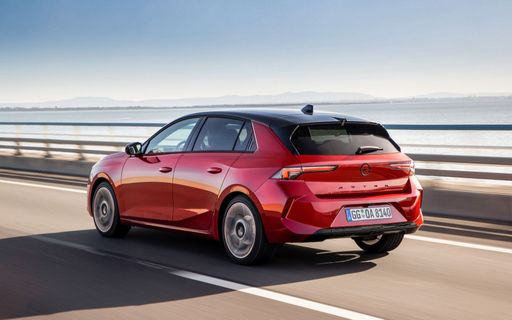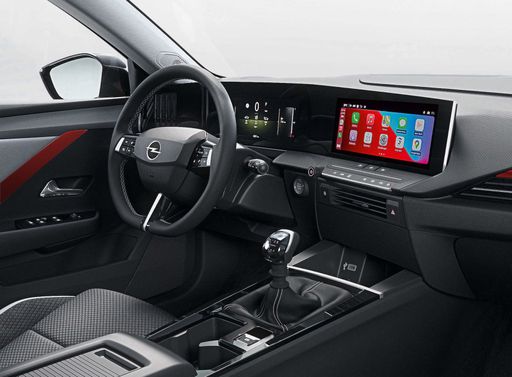Toyota Yaris VS Vauxhall Astra – Specs, Efficiency & Price Comparison
Which model is the better choice – the Toyota Yaris or the Vauxhall Astra? We compare performance (280 HP vs 225 HP), boot capacity (286 L vs 422 L), efficiency (3.80 L vs 15.50 kWh1.30 L), and of course, the price (21900 £ vs 23900 £).
Find out now which car fits your needs better!
The Toyota Yaris (Hatchback) is powered by a Full Hybrid or Petrol engine and comes with a Automatic or Manuel transmission. In comparison, the Vauxhall Astra (Hatchback) features a Petrol MHEV, Petrol, Diesel, Plugin Hybrid or Electric engine and a Automatic or Manuel gearbox.
When it comes to boot capacity, the Toyota Yaris offers 286 L, while the Vauxhall Astra provides 422 L – depending on what matters most to you. If you’re looking for more power, you’ll need to decide whether the 280 HP of the Toyota Yaris or the 225 HP of the Vauxhall Astra suits your needs better.
There are also differences in efficiency: 3.80 L vs 15.50 kWh1.30 L. In terms of price, the Toyota Yaris starts at 21900 £, while the Vauxhall Astra is available from 23900 £.
Compare all the key specs now and find out which model fits your lifestyle best!
In the ongoing battle of compact cars, the Vauxhall Astra and Toyota Yaris each bring their unique strengths to the table. The Astra is renowned for its spacious interior and smooth handling, making it a comfortable choice for longer journeys. Meanwhile, the Yaris impresses with its superior fuel efficiency and compact size, ideal for city driving and tight parking spaces.
Toyota Yaris
The Toyota Yaris exudes a charming blend of practicality and style, making it an appealing choice for urban drivers. Its compact design allows for easy manoeuvrability in crowded city streets, while the interior offers a surprisingly spacious and comfortable environment. With a focus on fuel efficiency and reliability, the Yaris remains a popular option for those seeking a balance between performance and economy.
details @ Toyota
@ Toyota
 @ Toyota
@ Toyota
Vauxhall Astra
The Opel Astra exudes a sleek and modern design, making it a standout choice in the compact car segment. Its interior is thoughtfully crafted, providing both comfort and cutting-edge technology for an enhanced driving experience. The vehicle is also celebrated for its efficient performance, adeptly balancing power with fuel economy to suit urban and long-distance journeys alike.
details @ www.media.stellantis.com
@ www.media.stellantis.com
 @ www.media.stellantis.com
@ www.media.stellantis.com
 @ www.media.stellantis.com
@ www.media.stellantis.com
Battle of the Hatchbacks: Vauxhall Astra vs. Toyota Yaris
In the competitive world of hatchbacks, two popular models stand out: the Vauxhall Astra and the Toyota Yaris. Both vehicles offer a blend of style, efficiency, and performance, but which one takes the crown? Let’s delve into their technical aspects and latest innovations to find out.
Engines and Performance
The Vauxhall Astra impresses with a variety of engine options, including petrol, diesel, mild hybrid, plug-in hybrid, and a fully electric variant. Power output ranges from 110 to 225 HP, catering to a diverse range of drivers. The Astra accelerates from 0-100 km/h in 7.5 to 10.6 seconds depending on the variant, with a top speed of up to 235 km/h.
On the other hand, the Toyota Yaris offers fewer engine choices but stands out with its full hybrid technology. The available engines deliver between 116 and 130 HP, with the hybrid system achieving a remarkable 3.8 L/100 km fuel consumption. The Yaris has a quicker acceleration in the 0-100 km/h sprint for the top-end variants, at just 5.5 seconds, but tops out at a lower 230 km/h max speed.
Transmission and Drive
Both the Astra and Yaris come equipped with modern transmission systems. The Astra offers a variety of options, including dual-clutch automatic and manual gearboxes. Its front-wheel drive system ensures efficient power distribution and handling.
The Yaris provides a choice between a CVT and a manual gearbox, along with both front-wheel and all-wheel drive systems, offering versatility based on driving needs and conditions.
Size and Practicality
When it comes to dimensions, the Astra is longer, measuring 4374 mm, while the Yaris ranges between 3940 mm and 3995 mm. This difference translates into greater trunk space for the Astra at 422 liters compared to the Yaris’s 286 liters, making the Astra a better option for those requiring more storage on the go.
Yet, the Yaris takes the lead with its lighter curb weight of 1090 kg, potentially resulting in better agility and fuel efficiency, particularly in urban environments.
Technology and Features
Both models are equipped with cutting-edge technology. The Astra focuses on a digital cockpit experience, with features like a fully digital instrument cluster and advanced infotainment options designed with connectivity in mind.
The Yaris doesn't fall behind, offering intuitive hybrid systems and a range of driving aids that emphasize safety and efficiency. Its hybrid variant stands out for its eco-friendly performance, with CO2 emissions starting as low as 87 g/km.
Final Thoughts
The Vauxhall Astra and Toyota Yaris each bring unique strengths to the hatchback segment. If you are looking for diversity in powertrains and more storage capacity, the Astra might be the better choice. However, if advanced hybrid technology and lightweight maneuverability are your priorities, the Toyota Yaris is hard to beat.
Ultimately, the decision will boil down to personal preferences regarding power, efficiency, and practicality. Both vehicles promise a rewarding driving experience, keeping you pleased whether you choose the modernized Astra or the innovative Yaris.

|

|
|
|
|
Costs and Consumption |
|
|---|---|
|
Price
21900 - 45000 £
|
Price
23900 - 40500 £
|
|
Consumption L/100km
3.8 - 9.5 L
|
Consumption L/100km
1.3 - 6 L
|
|
Consumption kWh/100km
-
|
Consumption kWh/100km
15.5 - 15.6 kWh
|
|
Electric Range
-
|
Electric Range
57 - 418 km
|
|
Battery Capacity
-
|
Battery Capacity
11.3 - 51 kWh
|
|
co2
87 - 215 g/km
|
co2
0 - 135 g/km
|
|
Fuel tank capacity
36 - 50 L
|
Fuel tank capacity
42 - 52 L
|
Dimensions and Body |
|
|---|---|
|
Body Type
Hatchback
|
Body Type
Hatchback
|
|
Seats
4 - 5
|
Seats
5
|
|
Doors
3 - 5
|
Doors
5
|
|
Curb weight
1090 - 1356 kg
|
Curb weight
1332 - 1736 kg
|
|
Trunk capacity
141 - 286 L
|
Trunk capacity
352 - 422 L
|
|
Length
3940 - 3995 mm
|
Length
4374 mm
|
|
Width
1745 - 1805 mm
|
Width
1860 mm
|
|
Height
1455 - 1500 mm
|
Height
1432 - 1488 mm
|
|
Payload
289 - 525 kg
|
Payload
444 - 509 kg
|
Engine and Performance |
|
|---|---|
|
Engine Type
Full Hybrid, Petrol
|
Engine Type
Petrol MHEV, Petrol, Diesel, Plugin Hybrid, Electric
|
|
Transmission
Automatic, Manuel
|
Transmission
Automatic, Manuel
|
|
Transmission Detail
CVT, Schaltgetriebe, Automatikgetriebe
|
Transmission Detail
Dual-Clutch Automatic, Manual Gearbox, Schaltgetriebe, Automatikgetriebe, Automatic Gearbox, Reduction Gearbox, Automat. Schaltgetriebe (Doppelkupplung)
|
|
Drive Type
Front-Wheel Drive, All-Wheel Drive
|
Drive Type
Front-Wheel Drive
|
|
Power HP
116 - 280 HP
|
Power HP
110 - 225 HP
|
|
Acceleration 0-100km/h
5.5 - 9.7 s
|
Acceleration 0-100km/h
7.5 - 10.6 s
|
|
Max Speed
175 - 230 km/h
|
Max Speed
170 - 235 km/h
|
|
Torque
390 Nm
|
Torque
205 - 360 Nm
|
|
Number of Cylinders
3
|
Number of Cylinders
3 - 4
|
|
Power kW
85 - 206 kW
|
Power kW
81 - 165 kW
|
|
Engine capacity
1490 - 1618 cm3
|
Engine capacity
1199 - 1598 cm3
|
General |
|
|---|---|
|
Model Year
2024 - 2025
|
Model Year
2023 - 2025
|
|
CO2 Efficiency Class
B, G
|
CO2 Efficiency Class
C, D, B, A
|
|
Brand
Toyota
|
Brand
Vauxhall
|
Toyota Yaris
Introducing the Next-Gen Toyota Yaris: A Blend of Innovation and Technology
The Toyota Yaris has long been lauded for its efficiency, reliability, and practicality. As we venture into the 2024 model year, Toyota has upped the ante with the latest versions of this popular hatchback, melding cutting-edge technology with eco-conscious design. Here’s an in-depth look at what makes the current Yaris line-up stand out from the crowd.
Efficient Powertrains: Hybrid and Beyond
Spearheading the technological innovation in the Yaris range is the introduction of various hybrid models. The Yaris offers a 1.5-litre full-hybrid engine, marrying a petrol engine with an electric motor to produce between 116 and 130 PS. This power blend is controlled via a sophisticated CVT-gearbox, optimizing both performance and fuel efficiency, with consumption figures ranging from an impressive 3.8 to 4.2 litres per 100 km.
For those seeking pure performance, the GR Yaris variants provide a turbocharged 1.6-litre engine capable of producing 280 PS. This power is delivered via a choice of manual or automatic transmission, giving drivers the tactile involvement or convenience they desire.
Design that Fulfils and Inspires
The Yaris hasn't forgotten its roots as a compact, city-friendly hatchback, measuring between 3,940 and 3,995 mm in length. With its bold front grille, sleek lines, and a choice of striking colours, it's a car that turns heads while remaining perfectly suited for urban environments.
The interior is equally impressive, designed with a focus on driver convenience and comfort. Depending on the variant, Yaris can offer generous cargo space of up to 286 litres, making it a perfect companion for everyday tasks or weekend escapes.
Technological Integration: The Smart Choice
Toyota's approach goes beyond just improving engine technology; the Yaris is packed with innovative features aimed at enhancing the driving experience. It boasts a suite of advanced safety systems such as lane departure alert, pre-collision system, and adaptive cruise control, ensuring peace of mind on the road.
The infotainment system in the Yaris is designed to keep you connected, offering seamless smartphone integration, a user-friendly interface, and an intuitive navigation system, ensuring that you're always informed and entertained.
The Cost of Innovation
Owning a Yaris is not just about impressive technology; it's also about making economic sense. With a price range between €25,500 and €49,990, and monthly costs spanning from €748 to €1,513, it offers a broad spectrum to suit different budget needs.
Concerned about emissions? You can rest easy knowing that the Yaris boasts a CO2 efficiency class ranging from B to G, thanks to its low emissions output of between 87 to 215 g/km.
Conclusion: The Toyota Yaris Drives the Future
The Toyota Yaris continues to be a strong contender in the compact car segment, pushing boundaries with its innovative full-hybrid systems and performance-oriented GR models. It's a remarkable blend of design, technology, and economy, ensuring it remains a top choice for drivers who demand more from their hatchbacks.
Whether you're seeking the efficiency of a hybrid or the thrill of the GR Yaris, there's a model tailored to your unique driving needs in Toyota's latest Yaris lineup.
Vauxhall Astra
Opel Astra: A Legacy of Innovation and Technology
The Opel Astra has been a staple in the automotive market, continuously evolving to integrate cutting-edge technology and innovation. The latest versions of the Astra model continue this tradition, offering a range of engine types and an array of features designed to enhance driving performance and efficiency.
A Comprehensive Range of Powertrains
The latest Opel Astra models boast a selection of advanced powertrains, providing options for every type of driver. From the efficiency-oriented Mild-Hybrid engines to the cutting-edge fully electric variants, the Opel Astra is tailored to meet diverse customer needs. Car enthusiasts can choose from petrol, diesel, and hybrid engine types, with power outputs ranging between 110 PS and 225 PS, ensuring both efficiency and performance.
Sustainability Meets Performance
In an era where sustainability is paramount, the Opel Astra makes significant strides with its eco-friendly models. The Plug-In Hybrid options within the range offer an impressive fuel consumption rate of just 1.3 L/100km, highlighting Opel's commitment to reducing carbon footprints. Furthermore, the fully electric Astra model boasts an extended range of up to 418 km, catering to the growing demand for zero-emission vehicles.
Advanced Driving Dynamics
The Opel Astra is not just about power; it also offers an exceptional driving experience. With advanced gear options such as automatic transmissions and fine-tuned manual gearboxes, the Astra ensures smooth transitions and responsiveness. The front-wheel-drive configuration provides balanced handling, making it suitable for various driving conditions.
Technology and Features Galore
Opel has equipped the Astra with a myriad of technological advancements aimed at enhancing the driving experience. Cutting-edge infotainment systems, driver-assistance features, and comfortable interiors make every journey enjoyable. Buyers can also choose from multiple trim levels to personalise their Astra, ensuring it fits their lifestyle perfectly.
A Versatile and Stylish Design
The Opel Astra's sleek and modern design makes a bold statement on the road. With dimensions of 4,374 mm in length and a width of 1,860 mm, the Astra strikes a confident pose. Despite its compact build, the hatchback offers ample interior space, including a boot capacity ranging from 352 to 422 litres, embodying practicality without compromising on style.
Value for Money
Starting at a competitive price range between 27,910 € and 47,260 €, the Opel Astra offers excellent value for its array of features and performance capabilities. Its cost-effectiveness is also evident in the monthly operational costs, making it an attractive option for consumers looking for a reliable and cost-efficient vehicle.
The Opel Astra continues to set benchmarks in the compact car segment, effortlessly blending innovation, sustainability, and performance. With its range of versatile powertrains and cutting-edge technology, the Astra is poised to meet the demands of modern drivers while contributing to a greener future.
The prices and data displayed are estimates based on German list prices and may vary by country. This information is not legally binding.
